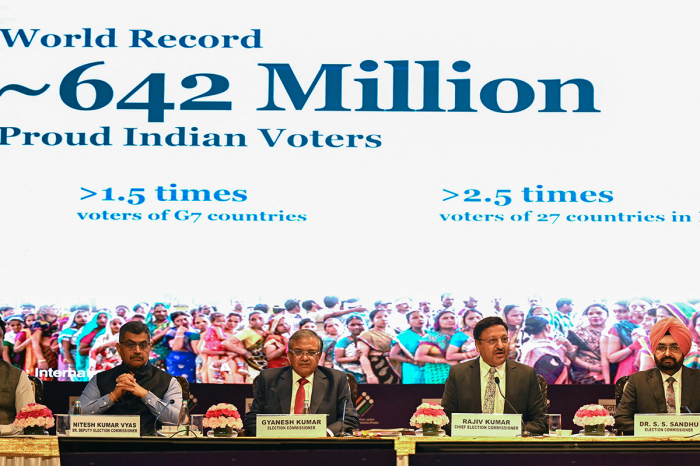Christians on edge as India prepares to announce election results

INDIA — More than a billion people, including 26 million Christians in the world’s most populous country, will be glued to their televisions on Tuesday to watch the results of the national elections. While exit polls suggest that the ruling Bharatiya Janata Party is likely to secure a third consecutive term, Christians are hoping and praying for respite, having experienced the worst attacks over the past three years under the Hindu nationalist government.
Several exit polls have projected that Prime Minister Narendra Modi-led National Democratic Alliance (NDA) will retain power for the third time, securing more than 350 of the total 543 seats. These polls came as a surprise to many, given the grim mood among BJP members and a surge in confidence within the opposition Indian National Developmental Inclusive Alliance (INDIA), led by the Left-of-Centre Congress Party, during the seven-phase elections held from April 19 to June 1.
The opposition fears manipulation in the counting of votes.
On Sunday, Congress Party leaders Mallikarjun Kharge and Rahul Gandhi used video-conferencing to discuss the national elections with party candidates, as reported by the Indian media outlet, The Wire. Despite exit polls favoring the BJP, they remained optimistic about defeating the ruling government. Gandhi dismissed the exit polls as “fantasy” and a “Modi-Media poll,” while other opposition leaders criticized them as fake and manipulated.
Akhilesh Yadav, the chief of the Samajwadi Party in northern Uttar Pradesh state, was quoted as saying that the exit polls showing the BJP winning more than 300 seats were intended to create a scope for manipulation.
Civil society groups have expressed concerns over the independence of the Election Commission of India.
In December 2023, the BJP government passed legislation on the appointment of the chief election commissioner and the two other election commissioners by a committee composed of the prime minister, the leader of the opposition and a third member — a federal minister chosen by the prime minister, as reported by the Indian legal news outlet LiveLaw at the time.
This was contrary to a March 2023 decree by the Supreme Court of India’s constitutional bench. The decree held that the committee must include the prime minister, the leader of the opposition in the Lower House or the leader of the largest opposition party as well as the chief justice of India.
Further, while the BJP’s top leaders, including Prime Minister Modi, openly referred to religion to ask for votes in their speeches in violation of the Representation of the People Act, 1951, and the Election Commission of India’s model code of conduct, the Election Commission of India did not take any action despite numerous complaints filed, according to the Indian fact-checking website Alt News.
Furthermore, the election has not been seen as fair, given the alleged means the BJP used to get donations.
In January 2018, the BJP government introduced “electoral bonds,” government-issued, anonymized financial instruments that allow donors to fund political parties. These bonds are available exclusively through the State Bank of India. They sparked controversy over transparency and potential money laundering concerns, as they maintain donor anonymity.
Months before the 2024 national election, the Supreme Court of India ordered the State Bank of India to release data on electoral bonds. This data revealed that from April 2019 to February 2024, 22,217 electoral bonds were purchased, with the BJP receiving nearly 48% of the total redeemed bonds. This amounted to 60.6 billion rupees, or roughly $757 million, as reported by India’s Frontline magazine.
Furthermore, over the past decade, the BJP has significantly deepened societal divisions, increasingly setting the majority Hindu community against the minority Christian and Muslim populations.
According to the New Delhi-based United Christian Forum, 2021 witnessed at least 486 incidents of violence against Christians, making it the most violent year for this community in the history of India. This disturbing pattern continued into 2022, with nearly 600 attacks recorded. By 2023, the frequency of these incidents had escalated even further, significantly exceeding 600.
What exacerbates the situation is India’s rapid shift toward authoritarianism. In its 2021 annual report on global political rights and liberties, the U.S.-based nonprofit Freedom House downgraded India from a “free democracy” to a “partially free democracy,” as reported by the BBC. In the Democracy Report 2024 released by the Sweden-based V-Dem Institute, which tracks democratic freedoms worldwide, India was downgraded — from the status of an “electoral autocracy” in 2018 — to “one of the worst autocratizers,” as reported by The Hindu newspaper.
If the BJP emerges victorious, it could worsen the already increasing attacks on minority Christians and Muslims, and likely be perceived as an endorsement of Modi’s authoritarian style of governance.





























